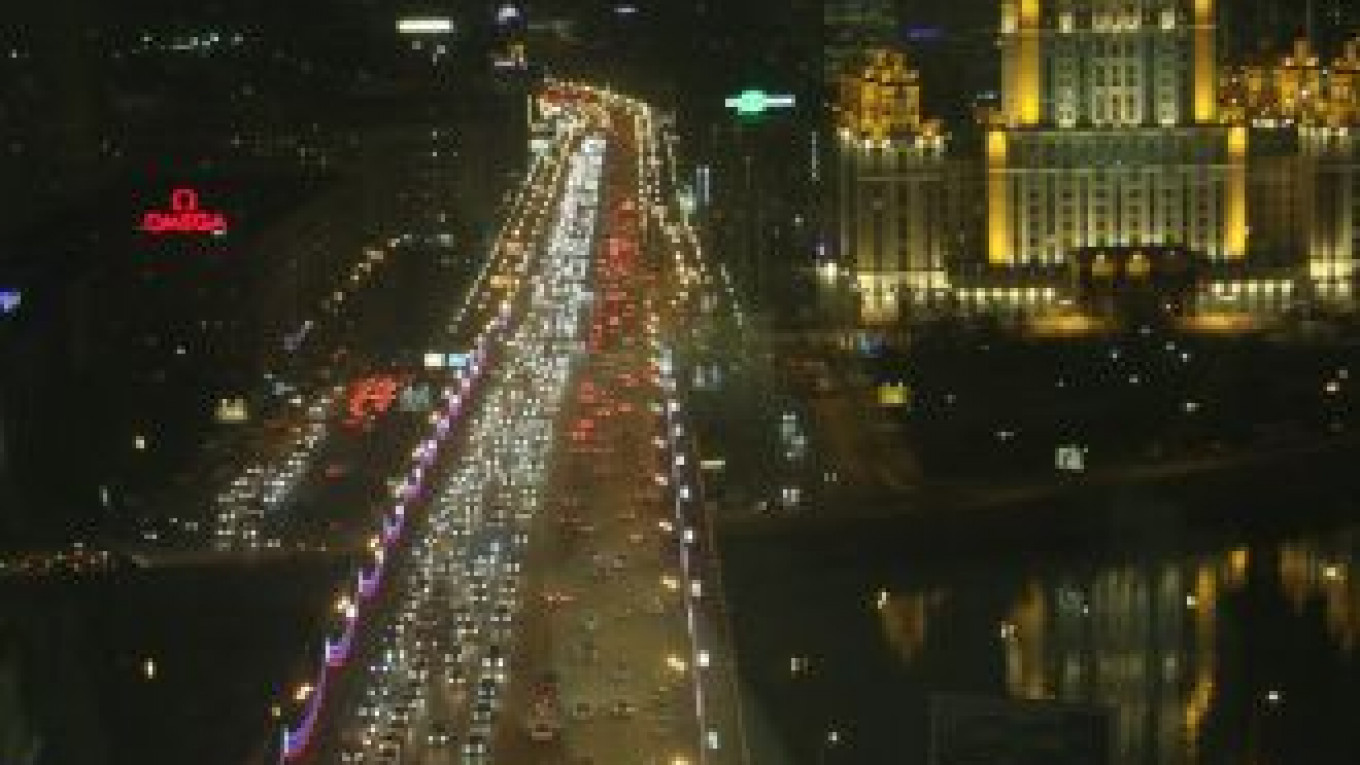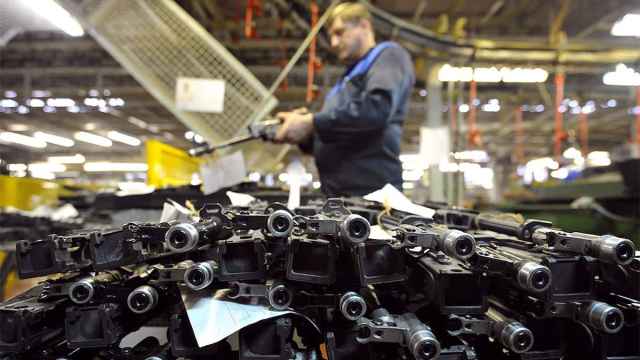Moscow's city authorities will do anything to tackle the city's gargantuan traffic problems, from fiddling with the timing on traffic lights to unblocking cutoff lanes and pumping millions into new highways.
But so far they've shied away from one of the most powerful weapons in the congestion fighter's arsenal — charging drivers to enter the city center.
But Michael Weber, head of Eastern European operations for Kapsch TrafficCom, an Austrian traffic management company, said it was only a matter of time.
"It's the only way people will change their behavior," he told The Moscow Times during a visit to Moscow last week.
Parking Meters: Thin End of the Wedge
While introduction of a London-style charge for driving in city center is probably a long way off, experts reckon it won't be long before the government tries an alternative: paid parking.
Until recently the right to free on-street parking was enshrined in Russian law, making it illegal for local authorities to introduce hourly fees. But a federal law changing that came into force on July 25.
Just days later, transport officials in St. Petersburg said they planned to introduce paid parking "within six months."
"[Moscow Mayor Sergei] Sobyanin won't want to do anything about it before the elections. But I'd say we'll be seeing it next year," said Mikhail Blinkin, a scientific head of the Institute for Traffic and Roads.
A spokesperson for the Moscow transport department said authorities were currently focused on "creating more parking spaces" in order to reduce traffic in the center, but did not mention charging a toll for on-street parking.
And that can be a powerful deterrent in itself.
"What's paid parking if not a time-based tolling?" Weber said. "Some Italian cities have been very successful in cutting traffic in the center by banning parking for everyone except residents."
He has reason to push the idea — Kapsch, which entered Russia three years ago, is one of the leading traffic management and tolling companies in the world, and would be a likely contender to build and manage the Moscow charging system if it should happen.
It is also a way of conditioning the public to the idea of paying up to use the roads.
"When [then-London Mayor] Ken Livingstone introduced the congestion charge in London, paid parking had already been in place for some years — Londoners were already accustomed to the idea that driving in the city center was expensive," Blinkin said. "So in a sense, paid parking is a first step to zone charging."
Could it Really Happen Here?
Sergei Udalov, director of the Avtostat transport think tank, is skeptical.
"I don't think a charging scheme would be realistic until you've sorted out other questions, like parking spaces — of which we have practically none in the center," Udalov said by telephone.
"You can't charge me for driving around the center if you haven't given me a place to park my car," he pointed out. "Besides, you've got to address the question of adequate replacement transport," he said.
A transport department spokeswoman told The Moscow Times on Monday that officials were focusing on exactly that question.
"We're working on other options, primarily on creating more parking spaces inside and outside the city so people do not have to drive around the center," the spokesperson said by telephone.
Asked about the possibility of a congestion charge, she said, "There are no concrete plans for congestion charging at this time."
Perennial Topic
The idea of charging vehicles for entry into downtown Moscow has been considered periodically by the city since at least 2007, when then-Mayor Yury Luzhkov first publicly proposed the measure.
In a typical populist touch, Luzhkov later vetoed the scheme after talking to disgruntled Londoners.
His successor Sobyanin cautiously re-floated the idea in a policy document released by City Hall's transportation department in October last year, which suggested that a congestion charge could be introduced by 2013.
Sobyanin again hinted at some kind of charge in July, when he said on the city-owned TV Center channel that vehicles using more polluting fuels could face restrictions within a year.
But he avoided mentioning charges and promised that "light vehicles" below the Euro-4 fuel standard would not be hit by whatever measures were imposed.
Parking
Russian transport chiefs have already embraced tolling on federal highways to help fund ambitious road building and upgrading programs.
Weber's company has entered the tender to operate the tolling system on the M4 Don highway, which connects Moscow with Rostov-on-Don.
The controversial new Moscow-St. Petersburg highway will also be a toll road.
Inner-city charging presents a new range of technical challenges and political difficulties — but Weber says it is not a question of "if," but "when."
"It's a delicate political question. No one wants to do it ahead of an election, and of course, just after elections no one's doing anything either," said Weber, whose division also runs traffic management and toll schemes in Poland, Bulgaria and Kazakhstan.
"It's so unpopular that even strong mayors often have to say 'no, we're not going to do that, it's not for us.'"
The term "charge" is so toxic that city authorities go to great lengths to find euphemisms. Usually mayors like to call it an "access" scheme.
"But it is coming. We just don't know when," Weber said.
Problems
But what would a Moscow congestion charge actually look like?
Not like London's, that's for sure, Blinkin said.
"In London, the problem was in the center, while on the outskirts traffic flows pretty freely. But in Moscow, our worst congestion is on the outskirts of the city.
"The problem is not on the Boulevard Ring or even the Garden Ring," Blinkin said. "It's on the periphery. How are you going to deal with that?"
Another problem is that tracking owners by car registration number is much more difficult in Russia than in Britain.
Weber, who has been advising Russian officials on "what is possible and what they want," said current thinking among traffic chiefs tends toward charges for specific streets rather than a London-style charge zone across the city center.
And some ideas that were floated in the policy document released in October — like using satellite tracking for tolling purposes — are not as practical as they sound.
GPS technology, or even Russia's Glonass system, is simply not yet accurate enough to be used as a basis for charging people money, Weber said.
Instead, any tolling system would most likely operate electronically, with cars carrying a small sensor attached to the inside of the windshield that signals each time it passes sensors at strategic points around the city.
That could be supplemented with cameras to recognize license plates, and laser scanners that could identify the color of a vehicle and the model by its silhouette.
Incentive
Weber argued that experience in London and elsewhere has proved it a powerful incentive — sometimes in unintended ways.
In Singapore, which runs an Electronic Road Pricing system, the government decided that drivers would not be charged when stuck in traffic jams — since it represented a failure of service on the part of the state.
That resulted in drivers deliberately slowing to a halt until the tariff — digitally displayed on panels at the roadside — dropped to zero, before speeding up again.
Even government officials will do all they can to avoid the charge.
Russia owes £4.4 million ($7.2 million) in unpaid congestion charges in London, where the ambassador has refused to pay, citing diplomatic privileges.
About 50 other embassies including the U.S. and German missions have also refused to cough up, despite an uncompromising stance from Conservative Mayor Boris Johnson, who slapped a £122 fine on U.S. President Barack Obama when he failed to pay the congestion charge during a visit earlier this year.
To Weber, all of this is testament to the power of the financial incentive.
"Every city has to find the scheme that works for it," he said. But it can only work in conjunction with a slew of other measures, he warns.
"If you look at London, they extended the Underground, increased the number of buses and the number of taxis grew too. And they also chose the right charge."
The tariff has to be high enough to deter people from actually entering the center — rather than simply shrugging their shoulders and paying up.
"But we all know it is not going to happen overnight," Weber admitted. "It takes six months to change a law — minimum. And that's only if you know exactly what you want."
A Message from The Moscow Times:
Dear readers,
We are facing unprecedented challenges. Russia's Prosecutor General's Office has designated The Moscow Times as an "undesirable" organization, criminalizing our work and putting our staff at risk of prosecution. This follows our earlier unjust labeling as a "foreign agent."
These actions are direct attempts to silence independent journalism in Russia. The authorities claim our work "discredits the decisions of the Russian leadership." We see things differently: we strive to provide accurate, unbiased reporting on Russia.
We, the journalists of The Moscow Times, refuse to be silenced. But to continue our work, we need your help.
Your support, no matter how small, makes a world of difference. If you can, please support us monthly starting from just $2. It's quick to set up, and every contribution makes a significant impact.
By supporting The Moscow Times, you're defending open, independent journalism in the face of repression. Thank you for standing with us.
Remind me later.






